综合英语教程6 翻译
英专综合教程6册课文翻译及课后答案Answer to unit3

IV. Chinese Translation of Paragraphs1. 首先,我要强调的是,读书本应是一种享受。
当然,为了应付考试或者获取信息,许多书我们不得不读,而我们从中却不可能得到任何愉悦。
我们读这些书是出于教育的目的,至多希望自己对它的需要不至于使阅读的过程过于乏味。
我们读这些书并非好之乐之,而是出于无奈。
这当然不是我要谈的读书。
要谈的读书。
我接下去要谈论的书籍,既不能助您获得学位,也不能帮您谋生;既不能教您怎样驾驶帆船,也不能教您怎样启动熄火的车辆。
然而,它们却可以让您生活得更为充实。
不过,您必须喜欢读书才行,否则也无济于事。
2. 我这里所说的“您”,是指那些有闲的成年人,他们想读的不是非读不可的那些书。
我指的不是书虫,因为书虫们自有读书之道。
我这里只想谈些名著,那些很久以来广受推崇的杰作。
我们理应都读过这些名著,遗憾的是这类人却为数甚少。
有些名著不仅为优秀的批评家们所公认,文学史家也会有长篇大论,然而,今天的普通读者读之却味同嚼蜡。
这些作品对研究者来说是重要的,然而,时移事易,人们喜好变更,如今这些书早已失其原味,要读完全凭意志。
举例来说,我读过乔治·艾略特的《亚当·比德》,但我不能违心地说这个过程是愉悦的。
我读它是出于义务,读完了自然如释重负。
3. 关于这类书籍,我无意置喙。
每个人自有自己的评价和意见。
不论学者们对某本书作何评价,即便他们众口如一,极尽溢美之词,除非您感兴趣,否则它与您毫不相干。
不要忘记批评家也经常犯错,批评史上那些最著名的评论家的低级错误比比皆是。
一本书对您价值几何,只有作为读者的您才是最终评判人。
当然,这适用于我将要向您推荐的书籍。
我们每个人都不可能与他人完全一样,至多只是相仿而已。
因此,没有理由认为对我有益的书也正好对您有益。
不过,读这些书让我觉得内心更加富有;倘若我没有读过的话,恐怕我就不会完全是今天的我了。
所以我恳求您,倘若您在本文的诱惑之下去读我推荐的书,但却又读不下去,那就放下它们。
研究生英语综合教程UNIT6课文及翻译(含汉译英英译汉)
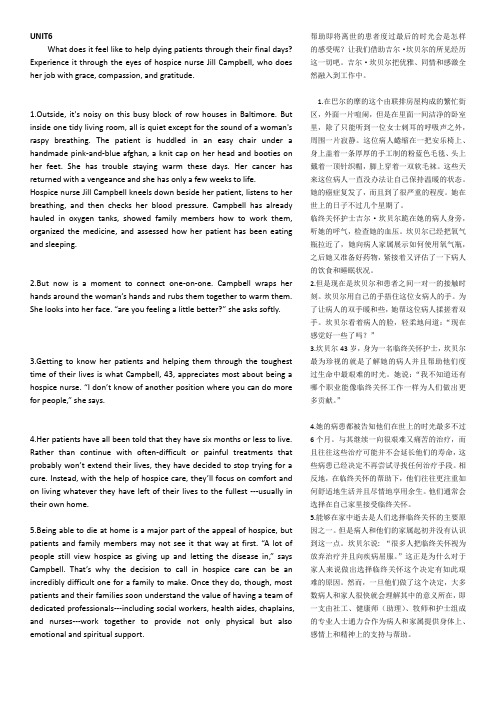
UNIT6What does it feel like to help dying patients through their final days? Experience it through the eyes of hospice nurse Jill Campbell, who does her job with grace, compassion, and gratitude.1.Outside, it's noisy on this busy block of row houses in Baltimore. But inside one tidy living room, all is quiet except for the sound of a woman's raspy breathing. The patient is huddled in an easy chair under a handmade pink-and-blue afghan, a knit cap on her head and booties on her feet. She has trouble staying warm these days. Her cancer has returned with a vengeance and she has only a few weeks to life. Hospice nurse Jill Campbell kneels down beside her patient, listens to her breathing, and then checks her blood pressure. Campbell has already hauled in oxygen tanks, showed family members how to work them, organized the medicine, and assessed how her patient has been eating and sleeping.2.But now is a moment to connect one-on-one. Campbell wraps her hands aro und the woman’s hands and rubs them together to warm them. She looks into her face. “are you feeling a little better?” she asks softly.3.Getting to know her patients and helping them through the toughest time of their lives is what Campbell, 43, appreciates most about being a hospice nurse. “I don’t know of another position where you can do more for people,” she says.4.Her patients have all been told that they have six months or less to live. Rather than continue with often-difficult or painful treatments that probably won’t extend their lives, they have decided to stop trying for a cure. Instead, with the help of hospice care, they’ll focus on comfort and on living whatever they have left of their lives to the fullest ---usually in their own home.5.Being able to die at home is a major part of the appeal of hospice, but patients and family members may not see it that way at first. “A lot of people still view hospice as giving up and letting the disease in,” says Campbell. That’s why the decision to c all in hospice care can be an incredibly difficult one for a family to make. Once they do, though, most patients and their families soon understand the value of having a team of dedicated professionals---including social workers, health aides, chaplains, and nurses---work together to provide not only physical but also emotional and spiritual support. 帮助即将离世的患者度过最后的时光会是怎样的感受呢?让我们借助吉尔·坎贝尔的所见经历这一切吧。
李荫华《全新版大学英语综合教程(6)》(第2版)学习指南【词汇短语+课文精解+全文翻译+练习答案】-
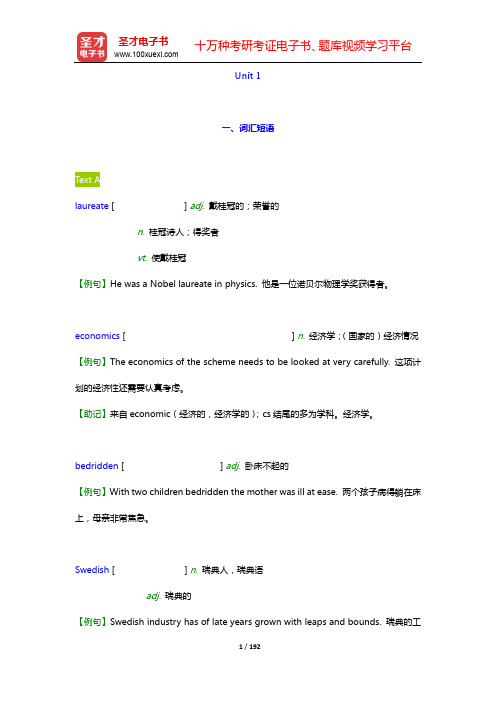
Unit 1一、词汇短语Text Alaureate [] adj. 戴桂冠的;荣誉的n. 桂冠诗人;得奖者vt. 使戴桂冠【例句】He was a Nobel laureate in physics. 他是一位诺贝尔物理学奖获得者。
economics [] n. 经济学;(国家的)经济情况【例句】The economics of the scheme needs to be looked at very carefully. 这项计划的经济性还需要认真考虑。
【助记】来自economic(经济的,经济学的);cs结尾的多为学科。
经济学。
bedridden [] adj. 卧床不起的【例句】With two children bedridden the mother was ill at ease. 两个孩子病得躺在床上,母亲非常焦急。
Swedish [] n. 瑞典人,瑞典语adj. 瑞典的【例句】Swedish industry has of late years grown with leaps and bounds. 瑞典的工业近年来飞跃增长。
revolutionary [] adj. 革命的;革新的n. 革命者;革命党人【例句】Many revolutionaries died for the revolution before the liberation. 在解放前,许多革命者为革命而牺牲了。
postwar [] adj. 战后的【例句】During the postwar years in Germany honors were heaped upon Einstein. 战后,爱因斯坦在德国备受称颂。
recognition [] n. 认出,辨认;承认;赏识【例句】My recognition of him was immediate. 我立刻认出是他。
【词组】in recognition of表彰,报偿beyond recognition 面目全非;识别不出raspy [] adj. (声音)刺耳的;易怒的;粗糙的【例句】My voice is raspy because I have a cold. 我的声音很刺耳,因为我感冒了。
综合英语教程第六册课后翻译参考答案

综英第六册课后翻译参考答案Unit 11.这项计划为智力迟钝者提供长期的照顾。
The program offers long-term care for the mentally retarded.2.他有一台又粗笨有庞大的旧电脑,速度慢,使用麻烦。
He’s got a cumbersome, bulky, old computer—it’s slow and complicated to use.3. 他沿着房间后部慢慢移动,尽量不引起别人注意。
He tried not to look conspicuous and moved slowly along the back of the room.4. 安装一个不同的计算机系统将会导致巨大的变化。
It would cause a tremendous upheaval to install a different computer system.5. 她再次与金牌失之交臂。
The gold medal continues to elude her.6. 你真是个傻瓜,竟然没抓住这么好的机会。
You’d be a fool not to embrace an opportunity as good as that.7.她的薪水将猛增10%。
Her salary will go up by a hefty 10%.8.我草草的留了张纸条给希拉里,塞在门缝底下。
I scrawled a quick note to Hilary and put it under her door.9.她的办公室视野极佳。
There’s a smashing view from her office.10 去那儿旅行很愉快,只是旅馆有些脏兮兮的。
The trip out there was swell, but the hotel was a bit crummy.Unit 21.这家公司是由几名有事业心的年轻人创立的。
英语专业综合教程第六册翻译练习答案
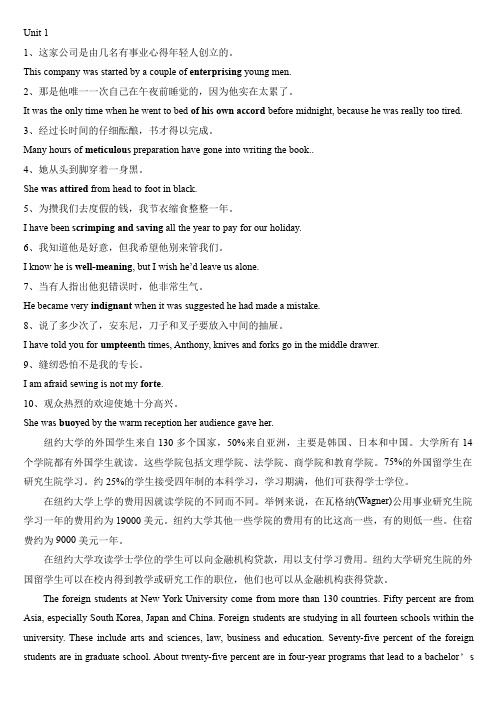
1、这家公司是由几名有事业心得年轻人创立的。
This company was started by a couple of enterprising young men.2、那是他唯一一次自己在午夜前睡觉的,因为他实在太累了。
It was the only time when he went to bed of his own accord before midnight,because he was really too tired. 3、经过长时间的仔细酝酿,书才得以完成。
Many hours of meticulous preparation have gone into writing the book..4、她从头到脚穿着一身黑。
She was attired from head to foot in black.5、为攒我们去度假的钱,我节衣缩食整整一年。
I have been scrimping and saving all the year to pay for our holiday.6、我知道他是好意,但我希望他别来管我们。
I know he is well-meaning,but I wish he’d leave us alone.7、当有人指出他犯错误时,他非常生气。
He became very indignant when it was suggested he had made a mistake.8、说了多少次了,安东尼,刀子和叉子要放入中间的抽屉。
I have told you for umpteen th times,Anthony,knives and forks go in the middle drawer.9、缝纫恐怕不是我的专长。
I am afraid sewing is not my forte.10、观众热烈的欢迎使她十分高兴。
She was buoy ed by the warm reception her audience gave her.纽约大学的外国学生来自130多个国家,50%来自亚洲,主要是韩国、日本和中国。
全新版大学英语(第二版)综合教程5-Unit-6课后答案及课文翻译
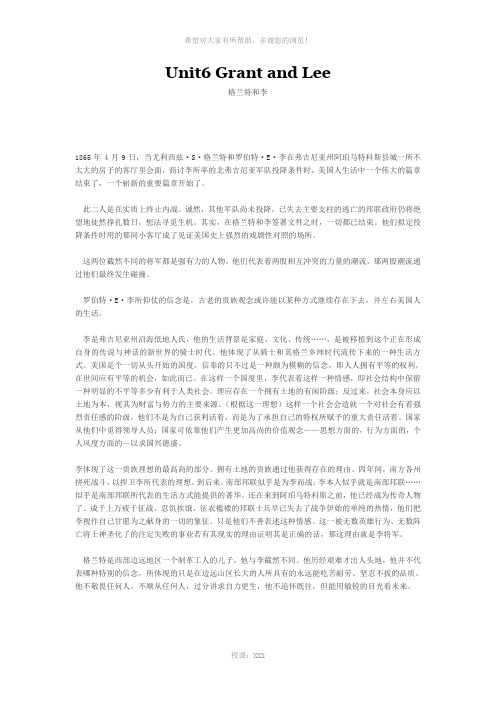
Unit6 Grant and Lee格兰特和李1865年4月9日,当尤利西兹·S·格兰特和罗伯特·E·李在弗吉尼亚州阿珀马特科斯县城一所不太大的房子的客厅里会面,商讨李所率的北弗吉尼亚军队投降条件时,美国人生活中一个伟大的篇章结束了,一个崭新的重要篇章开始了。
此二人是在实质上终止内战。
诚然,其他军队尚未投降,已失去主要支柱的逃亡的邦联政府仍将绝望地徒然挣扎数日,想法寻觅生机。
其实,在格兰特和李签署文件之时,一切都已结束。
他们拟定投降条件时用的那间小客厅成了见证美国史上强烈的戏剧性对照的场所。
这两位截然不同的将军都是强有力的人物,他们代表着两股相互冲突的力量的潮流,那两股潮流通过他们最终发生碰撞。
罗伯特·E·李所仰仗的信念是,古老的贵族观念或许能以某种方式继续存在下去,并左右美国人的生活。
李是弗吉尼亚州沿海低地人氏,他的生活背景是家庭、文化、传统……,是被移植到这个正在形成自身的传说与神话的新世界的骑士时代。
他体现了从骑士和英格兰乡绅时代流传下来的一种生活方式。
美国是个一切从头开始的国度,信奉的只不过是一种颇为模糊的信念,即人人拥有平等的权利,在世间应有平等的机会,如此而已。
在这样一个国度里,李代表着这样一种情感,即社会结构中保留一种明显的不平等多少有利于人类社会。
理应存在一个拥有土地的有闲阶级;反过来,社会本身应以土地为本,视其为财富与势力的主要来源。
(根据这一理想)这样一个社会会造就一个对社会有着强烈责任感的阶级,他们不是为自己获利活着,而是为了承担自己的特权所赋予的重大责任活着。
国家从他们中觅得领导人员;国家可依靠他们产生更加高尚的价值观念——思想方面的,行为方面的,个人风度方面的—以求国兴德盛。
李体现了这一贵族理想的最高尚的部分。
拥有土地的贵族通过他获得存在的理由。
四年间,南方各州拼死战斗,以捍卫李所代表的理想。
到后来,南部邦联似乎是为李而战;李本人似乎就是南部邦联……似乎是南部邦联所代表的生活方式能提供的菁华。
大学跨文化英语 综合教程I Unit 6 Making Sense of China课文翻译
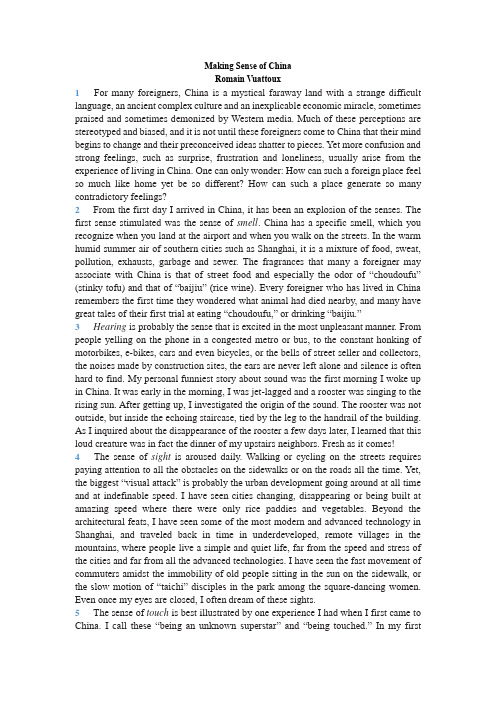
Making Sense of ChinaRomain Vuattoux1 For many foreigners, China is a mystical faraway land with a strange difficult language, an ancient complex culture and an inexplicable economic miracle, sometimes praised and sometimes demonized by Western media.Much of these perceptions are stereotyped and biased, and it is not until these foreigners come to China that their mind begins to change and their preconceived ideas shatter to pieces. Yet more confusion and strong feelings, such as surprise, frustration and loneliness, usually arise from the experience of living in China. One can only wonder: How can such a foreign place feel so much like home yet be so diff erent? How can such a place generate so many contradictory feelings?2 From the first day I arrived in China, it has been an explosion of the senses. The first sense stimulated was the sense of smell. China has a specific smell, which you recognize when you land at the airport and when you walk on the streets. In the warm humid summer air of southern cities such as Shanghai, it is a mixture of food, sweat, pollution, exhausts, garbage and sewer. The fragrances that many a foreigner may associate with China is that of street food and especially the odor of “choudoufu” (stinky tofu)and that of “baijiu” (rice wine). Every foreigner who has lived in China remembers the first time they wondered what animal had died nearby, and many have great tales of their fi rst trial at eating “choudoufu,” or drinking“baijiu.”3 Hearing is probably the sense that is excited in the most unpleasant manner. From people yelling on the phone in a congested metro or bus, to the constant honking of motorbikes, e-bikes, cars and even bicycles, or the bells of street seller and collectors, the noises made by construction sites,the ears are never left alone and silence is often hard to find. My personal funniest story about sound was the first morning I woke up in China. It was early in the morning, I was jet-lagged and a rooster was singing to the rising sun. After getting up, I investigated the origin of the sound. The rooster was not outside, but inside the echoing staircase, tied by the leg to the handrail of the building. As I inquired about the disappearance of the rooster a few days later, I learned that this loud creature was in fact the dinner of my upstairs neighbors. Fresh as it comes!4 The sense of sight is aroused daily. Walking or cycling on the streets requires paying attention to all the obstacles on the sidewalks or on the roads all the time. Yet, the bigge st “visual attack” is probably the urban development going around at all time and at indefinable speed. I have seen cities changing, disappearing or being built at amazing speed where there were only rice paddies and vegetables. Beyond the architectural feats, I have seen some of the most modern and advanced technology in Shanghai, and traveled back in time in underdeveloped, remote villages in the mountains,where people live a simple and quiet life, far from the speed and stress of the cities and far from all the advanced technologies. I have seen the fast movement of commuters amidst the immobility of old people sitting in the sun on the sidewalk, or the slow motion of “taichi” disciples in the park among the square-dancing women. Even once my eyes are closed, I often dream of these sights.5 The sense of touch is best illustrated by one experience I had when I first came to China. I call these “being an unknown superstar” and “being touched.” In my f irsteducational establishment, I sometimes had to teach in another campus on the other side of town. I would ride my bicycle across town to get to class, and it often felt like being in a movie. All the kids and adults stared and pointed to the “laowai” (foreigner) on his bicycle. As I took an excursion in the “deep” countryside, many people would approach me while I was buying some water or some snack and would start touching the hair on my arms.6 For foreigners as for Chinese, the most important sense is the sense of taste. It is also certainly the one that provides the most pleasure and the base of many relationships.I have been invited to many meals and took part in ceremonial drinking. I have seen food displays that are as elaborate as their tastes. Thousand-year-old eggs, snake, turtle, dumplings, bamboo,lotus root, pigs ears, lacquered ducks, duck neck and head, chicken feet,spicy fish head, the hundreds of ways of eating tofu are just some of the dishes that one discovers and appreciates. A lifetime would never suffice to try to taste all the specialties in China.7 Orderly chaos, disorganized order, old and new, beautiful and filthy,clean and dirty, rich and poor, kindness and arrogance ... All are opposed sensations and situations living together, side by side. For me, China is a collision of feelings, a juxtaposition of experiences and perceptions that are usually contradictory. China is all these contradictions and diversity that somehow manage to live together almost harmoniously.参考译文解读中国罗曼·瓦图对于很多外国人而言,中国是一个遥远而神秘的国度,有着奇特难懂的语言,古老深奥的文化,以及难以解释的经济奇迹,时而被西方媒体戴高帽,时而被他们妖魔化。
大学跨文化英语 综合教程I Unit 6 Getting Stared at in China课文翻译

Reading & DigestingGetting Stared at in ChinaAri James1 Have you ever walked into a room and caught everyone’s attention at once? Have you ever been gazed at, from top to bottom, as if you were an ancient, foreign relic on display? Have you ever stared back, challenging,only to have your surveyors continue to watch you, as if nothing has happened?2 These are daily occurrences for foreigners in China. I am stared at every single day as I go about my daily life. Be it on the street, in a store,or on the subway, I am stared at like a walking spectacle. While I cannot speak for all foreigners, I can, however, seek to critique and expand upon my own experiences in a global context.3 Chinese people are curious about the outsider, this I understand.However, staring is the least of it. Bolder strangers have asked to take a picture with me, or even of me. On a class trip, my two close friends and I, all women of color, noticed that people were sneaking pictures of us. Even worse, there was one older gentleman who approached us and asked to take photographs of us. Awkward and stunned into silence, he took our lack of response as an affirmative, and began positioning us the way he wanted us. Standing or kneeling, we did it all. I feel stupid now for having gone along with it, but as our professor stood behind the man and took pictures of us as well, laughing delightedly, it was difficult to see the insidious nature behind the hilarity of the situation.4 On my street in Nanjing, where I lived for four months, my neighbors continued to fall into a hush at the sight of me, their heads turning around quickly to watch as I neared. I have become friendly with some of them,gone so far as to chat with them, but the staring never ends. I continue to be the visiting roadside attraction, promising the audience new and exotic sights. There are hushed whispers in my wake, and every time, I wonder:when will they grow tired of me?5 The stares are not in any way malicious. I am entirely aware of this,but they are still able to catch my attention every time, to correct me whenever I dare to think thatI have grown accustomed to life here.6 As a multi-racial woman, it is difficult not to see the differences in the way varying foreigners are treated. From what I have experienced in the past, most Caucasian men seem to be approached with a sense of awe. These Caucasian men are asked if they are celebrities, perhaps even compared to Brad Pitt, before a request to take a selfe is posed. This could be the typical example of Western idolization in the East and the effect of years of Western media on Chinese culture. But perhaps, this is also tied to the colorism1 that is often rooted in Chinese culture and media.7 From every angle, Chinese people are bombarded with skin whitening products, with advertisements that feature Caucasian rather than Asian models, and whiteness continues to be idealized. The bud of bias in that very notion is that foreigners have come to be equated with whiteness.While the intent is not that of discrimination, the result is shockingly close.Where this notion leaves the rest of us, people of color, I do not know. In a culture obsessed with whiteness, where do the rest of us stand?8 From my experience alone, the lack of representation, and perhaps the lack ofunderstanding about other cultures, fuel the curiosity that many people I come across tend to possess. Curiosity is welcomed, and even encouraged. Curiosity will even ultimately be the key to fixing this problem. With education and exposure to different peoples and cultures,China can and will continue to flourish as a global hub. However, when curiosity begins to breed a lack of respect and consideration for others,that is where it has the ability to change into racism and even xenophobia.9 As China continues to globalize in an effort to make its mark on the economic marketplace and the cultural zeitgeist, I fear that it will be the lack of empathy and insensitivity that will stand in its way. Beijing is already a global center, with foreigners on almost every street, and yet this type of insensitivity continues to occur. Foreigners are here to enrich their lives, to learn more about China’s long history, and hopefully to make a positive impact on it as well. They deserve more appreciation and respect rather than mere staring eyes.参考译文在中国接受注目礼阿丽·詹姆斯你是否曾经走进一个房间,一下子就吸引了所有人的目光?你是否曾被人从头到脚审视,仿佛你是一件被展出的外国文物?你是否曾挑战性地回瞪对方,结果对方却好像什么事都没发生一样继续看着你?对生活在中国的外国人来说,这如同家常便饭。
- 1、下载文档前请自行甄别文档内容的完整性,平台不提供额外的编辑、内容补充、找答案等附加服务。
- 2、"仅部分预览"的文档,不可在线预览部分如存在完整性等问题,可反馈申请退款(可完整预览的文档不适用该条件!)。
- 3、如文档侵犯您的权益,请联系客服反馈,我们会尽快为您处理(人工客服工作时间:9:00-18:30)。
1. They can move a nation to fall on its knees and sincerely worship an Emperor who, without the clothes and the title, would drop to the rank of the cobbler and be swallowed up and lost sight of in the massed multitude of the inconsequentials...
衣着与头衔能让一个民族心甘情愿地跪拜在一个君主面前。
而这个君主,如果没有衣着和头衔的支撑,会沦为鞋匠之流,消失在芸芸众生之中。
2. Is the human race a joke? Was it devised and patched together in a dull time when there was nothing important to do?
人类是玩笑的结果吗?是上帝感到无聊又无大事可做时草草拼在一起的玩物吗?
3. Mine are able to expand a human cipher into a globe-shadowing portent.
我的衣着能把我从一个无名小卒变成了一个全球耀眼的巨人。
4. And probably at no other point is the sense of shabbiness so keenly felt as it is if we fall short of the standard set by social usage in this matter of dress.
可能最感到寒酸的时刻是我们没按照社会的规范穿着自己。
5. It is true of dress in even a higher degree than of most other items of other consumption, that people will undergo a very considerable degree of privation in the comforts or the necessaries of life in order to afford what is considered a decent amount of wasteful consumption.
人们为了能付得起一定量的、通常被认为是浪费性的消费,会在生活的其他方面尽量节俭。
这在穿衣方面表现得尤其明显。
6. The commercial value of the goods used for clothing in any modern community is made up to a much larger extent of the fashionableness, the reputability of the goods than of the mechanical service, which they render in clothing the person of the wearer.
在任何一个现代社会,用作穿着的商品的商业价值在很大程度上不取决于它的商业服务功能,而是该商品本身和在包装穿戴者时所产生的时髦效益及声誉。
7. This would require a loss of wholeness and self, a dishonest constraint.
这会使人们失去自我,是一种虚伪的限制。
1. Today, thanks to the democratization of technology, all sorts of countries have the opportunity to assemble the technologies, raw materials and funding to be producers, or subcontractors, of highly complex finished products or services, and this becomes another subtle factor knitting the world more tightly together.
今天,由于技术的普及,每个国家都有机会聚集各种技术、原材料和资金,成为制造商或转包商,生产或者销售高度复杂的终端产品或者服务,这成为另一种把世界更紧密地联系在一起的无形的因素。
2. The creation of this corporate bond market introduced some pluralism into the world of finance and took away the monopoly of the banks.
企业债券市场的出现,将多元化引入金融界,打破了银行的垄断。
3. Investment banks started approaching banks and home mortgage companies, buying up their whole portfolio of mortgage…
投资银行开始去找银行和房屋按揭公司,将它们的按揭债务全部买下
4. You could take your choice, and people did.
人们可以有多种选择,而且也确实这样做了。
5. By shrinking a world to a size smal l, globalization brings home to everyone just how ahead or behind they are.
全球化把世界缩小,全球化让每个人都可以看清楚,自己的日子是过得比人好还是比人差。
